- Home
- Chinua Achebe
The Education of a British-Protected Child
The Education of a British-Protected Child Read online
Also by Chinua Achebe
Anthills of the Savannah
The Sacrificial Egg and Other Stories
Things Fall Apart
No Longer at Ease
Chike and the River
A Man of the People
Arrow of God
Girls at War and Other Stories
Beware Soul Brother
Morning Yet on Creation Day
The Trouble with Nigeria
The Flute
The Drum
Home and Exile
Hopes and Impediments
How the Leopard Got His Claws (with John Iroaganachi)
Winds of Change: Modern Short Stories from Black Africa (coeditor)
African Short Stories (editor, with C. L. Innes)
Another Africa (with Robert Lyons)
For Charles P. Stevenson, Jr.
Contents
Preface
The Education of a British-Protected Child
The Sweet Aroma of Zik’s Kitchen: Growing Up in the Ambience of a Legend
My Dad and Me
What Is Nigeria to Me?
Traveling White
Spelling Our Proper Name
My Daughters
Recognitions
Africa’s Tarnished Name
Politics and Politicians of Language in African Literature
African Literature as Restoration of Celebration
Teaching Things Fall Apart
Martin Luther King and Africa
The University and the Leadership Factor in Nigerian Politics
Stanley Diamond
Africa Is People
Notes
Acknowledgments
Preface
In 2008, my first novel, Things Fall Apart, celebrated its fiftieth anniversary. Many people in different parts of the world joined in the festivities; it was quite a season. There were big intellectual conventions and small street-side performances. The people of my Nigerian hometown, Ogidi—which we still fondly call a village—went completely out of their way in originality and sheer audacity. They checked their stock, and took an ancient festival called Nwafor and turned it into the celebration of a book.
Was this reinvention of our regional festival a challenge to our ancestors and gods? In such dangerous situations, Ogidi people draw upon their wisdom and step carefully. Of all the festivities available to them, they chose Nwafor, a secular celebration dedicated to play and fun, feasting and fellowship; they avoided feuding deities. It was this joyful annual festival that Ogidi people decided to offer to Things Fall Apart, a book celebrating the immemorial customs of Ogidi for the first time in written fiction!
As the festival got underway, the old men and women of the town were perhaps puzzled by the events swirling around them, but not so their children, who were ready to embrace a more modern approach. I am told that a very talented actor—who had once played the role of Okonkwo with great success in a theatrical interpretation of Things Fall Apart performed in the state capital—was brought to the Ogidi town hall. There, his every step was cheered by the villagers. They could accept and recognize the unusual events going on around them, both about a book and everything else we now call our history.
During these celebrations, I thought also about this new book, a collection of essays that spans my career as a writer. I had high hopes for it. I wanted very much to shine the torch of variety and of difference on the experiences my life has served up to me, illuminating what it is that unites my writing and my personal life. I knew this would be hard to do; the book’s success would depend on what seamless effect I might contrive to tie these experiences together. This book would have to deal with real individual people, times, and topics. But there was no list that I was trying to complete, no group that I was making it my business to study from. This book would be personal and eclectic, therefore one could not look to it with scholarly intentions to learn about me completely.
I began to pull together the various pieces. The essay called “My Daughters” took its place without a fuss. I continued, working on other subjects, until my editor read the collection and asked me, “What about the boys?” I knew immediately that the next question would be: “Where is your wife?” and that my entire scheme for this collection—which passed over certain aspects of my life—was untenable. Would I also leave out the motor accident that, in 1990, cost me the use of my legs? What would I tell about the accident—except that my son and I were in the backseat and that it was he who, unable to roll the car away from me, rushed back to the road and shouted my name so that every car stopped and they took me to a hospital… If my son hadn’t been there it would have been a different story.
My wife, Christie, was teaching her favorite counseling class to graduate students at the University of Nigeria when they brought her the news of my accident. She put her professional life on hold then and there; and now. It was Christie and our two girls—Chinelo and Nwando—and two boys—Ikechukwu and Chidi—who saw me through. Would I—could I—write about all of this? No, I knew this book would have gaps and deletions as topics and essays moved naturally from one to the next.
As I completed the book, an invitation I had earlier received from the Library of Congress in Washington, D.C., served as an opportunity to bring together the events from my past with some thoughts of the future. The library had asked me to join them in celebrating the anniversary of Things Fall Apart, as well as my seventy-eighth birthday. When this occasion arrived, I was very well received by the staff of the library. They couldn’t stop telling me how proud they were that I was actually present. The date was November 3, 2008.
I had a full house. An incredible drummer from Cameroon held us in his spell. I read my poems and signed copies of my books. Then, to a great burst of applause, I watched a huge birthday cake coming up the ramp slowly towards me. All I could say by way of speech was: “Is this what you normally do?” I don’t know what answer I expected. But I remember a most extraordinary comment made to me earlier that day by an African-American lady. She had thanked me once again for my visit and added, with an element of both bargain and folklore: “And tomorrow we shall elect an African president for you.”
It is likely that in years to come folks will be asking their fellows what they were doing when Barack Obama was elected president. I hope we shall not be asking where we were or what we were doing but what the news did to us.
Chinua Achebe
Annandale-on-Hudson, New York
2009
The Education of a British-Protected Child
The title I have chosen for these reflections may not be immediately clear to everybody and, although already rather long, may call for a little explanation or elaboration from me. But before I get to that, I want to deal with something which gives me even more urgent cause for worry—its content.
I hope my readers are not expecting to encounter the work of a scholar. I had to remind myself, when I was invited to give this address, that if they think you are a scholar, it must mean you are a scholar, of sorts. I say this “up front,” as Americans would put it, to establish the truth quite early and quite clearly in case somehow a mistake has been made.
Though I would much rather have a successful performance than the satisfaction of being exonerated in failure, I cannot help adding that failure, sad as it would be, might also reveal the workings of poetic justice, because I missed the opportunity of becoming a clear-cut scholar forty years ago when Trinity College, Cambridge, turned down my application to study there after I took my first degree at the new University College, Ibadan. My teacher and sponsor from Ibadan had been a Cambridge man himself—one James Welch, ab
out whom I shall say a few more words later. Anyhow, I stayed home then, and became a novelist. The only significant “if” of that personal history is that you, ladies and gentlemen, would be reading a scholarly essay today rather than an impressionistic story of a boy’s growing up in British colonial Nigeria.
As you can see already, nothing has the capacity to sprout more readily or flourish more luxuriantly in the soil of colonial discourse than mutual recrimination. If I become a writer instead of a scholar, someone must take the rap. But even in such a rough house, masked ancestral spirits are respected and accorded immunity from abuse.
In 1957, three years after my failed Cambridge application, I had my first opportunity to travel out of Nigeria to study briefly at the BBC Staff School in London. For the first time I needed and obtained a passport, and saw myself defined therein as a “British Protected Person.” Somehow the matter had never come up before! I had to wait three years more for Nigeria’s independence in 1960 to end that rather arbitrary protection.
I hope nobody is dying to hear all over again the pros and cons of colonial rule. You would get only cons from me, anyway. So I want to indulge in a luxury which the contemporary culture of our world rarely allows: a view of events from neither the foreground nor the background, but the middle ground.
That middle ground is, of course, the least admired of the three. It lacks luster; it is undramatic, unspectacular. And yet my traditional Igbo culture, which at the hour of her defeat had ostensibly abandoned me in a basket of reeds in the waters of the Nile, but somehow kept anxious watch from concealment, ultimately insinuating herself into the service of Pharaoh’s daughter to nurse me in the alien palace; yes, that very culture taught me a children’s rhyme which celebrates the middle ground as most fortunate:
Obu-uzo anya na-afu mmo
Ono-na-etiti ololo nwa
Okpe-azu aka iko
The front one, whose eye encounters spirits
The middle one, the dandy child of fortune
The rear one of twisted fingers.
Why do the Igbo call the middle ground lucky? What does this place hold that makes it so desirable? Or, rather, what misfortune does it fence out? The answer is, I think, Fanaticism. The One Way, One Truth, One Life menace. The Terror that lives completely alone. So alone that the Igbo call it Ajo-ife-na-onu-oto: Bad Thing and Bare Neck. Imagine, if you can, this thing so alone, so singularly horrendous, that it does not even have the company of a necklace on its neck. The preference of the Igbo is thus not singularity but duality. Wherever Something Stands, Something Else Will Stand Beside It.
The middle ground is neither the origin of things nor the last things; it is aware of a future to head into and a past to fall back on; it is the home of doubt and indecision, of suspension of disbelief, of make-believe, of playfulness, of the unpredictable, of irony. Let me give you a thumbnail sketch of the Igbo people.
When the Igbo encounter human conflict, their first impulse is not to determine who is right but quickly to restore harmony. In my hometown, Ogidi, we have a saying, Ikpe Ogidi adi-ama ofu onye: The judgment of Ogidi does not go against one side. We are social managers rather than legal draftsmen. Our workplace is not a neat tabletop but a messy workshop. In a great compound, there are wise people as well as foolish ones, and nobody is scandalized by that.
The Igbo are not starry-eyed about the world. Their poetry does not celebrate romantic love. They have a proverb, which my wife detests, in which a woman is supposed to say that she does not insist that she be loved by her husband as long as he puts out yams for lunch every afternoon. What a drab outlook for the woman! But wait, how does the man fare? An old villager once told me (not in a proverb but from real life): “My favorite soup is egusi. So I order my wife never to give me egusi soup in this house. And so she makes egusi every evening!” This is then the picture: The woman forgoes love for lunch; the man tells a lie for his supper!
Marriage is tough; it is bigger than any man or woman. So the Igbo do not ask you to meet it head-on with a placard, nor do they ask you to turn around and run away. They ask you to find a way to cope. Cowardice? You don’t know the Igbo.
Colonial rule was stronger than any marriage. The Igbo fought it in the battlefield and lost. They put every roadblock in its way and lost again. Sometimes I am asked by people who read novels as if novels were history books, what made the conversion of my people to Christianity in Things Fall Apart so easy.
Easy? I can tell you that it was not easy, neither in history nor in fiction. But a novel cannot replicate historical duration; it has to be greatly compressed. In actual fact, Christianity did not sweep through Igboland like wildfire. One illustration will suffice. The first missionaries came to the Niger River town of Onitsha in 1857. From that beachhead they finally reached my town, Ogidi, in 1892. Now, the distance from Onitsha to Ogidi is only seven miles. Seven miles in thirty-five years: that is, one mile every five years. That is no whirlwind.
I must keep my promise not to give a discourse on colonialism. But I will state simply my fundamental objection to colonial rule.
In my view, it is a gross crime for anyone to impose himself on another, to seize his land and his history, and then to compound this by making out that the victim is some kind of ward or minor requiring protection. It is too disingenuous. Even the aggressor seems to know this, which is why he will sometimes camouflage his brigandage with such brazen hypocrisy.
In the closing years of the nineteenth century, King Leopold II of the Belgians, whose activity in the Congo became a byword for colonial notoriety, was yet able to utter these words with a straight face:
I am pleased to think that our agents, nearly all of whom are volunteers drawn from the ranks of the Belgian Army, have always present in their minds a strong sense of the career in which they are engaged, and are animated with a pure feeling of patriotism; not sparing their own blood, they will the more spare the blood of the natives, who will see in them the all powerful protectors of their lives and their property, benevolent teachers of whom they have so great a need.1
It would be downright silly to suggest a parallel between British colonial rule in Nigeria and the scandalous activity of His Serene Majesty Leopold II in the Congo. And yet we cannot ignore the basic assumption of all European powers that participated in the Scramble for Africa. Just as all of Europe had contributed to the making of the dreadful character Mr. Kurtz, in Conrad’s Heart of Darkness, so had all of Europe collaborated in creating the Africa that Kurtz would set out to deliver and that he would merely subject to obscene terror.
The grandiose words of King Leopold II may remind us that the colonizer was also wounded by the system he had created. He may not have lost land and freedom, like his colonized victim, but he paid a number of seemingly small prices, like the loss of a sense of the ridiculous, a sense of proportion, a sense of humor. Do you think Leopold II would have been capable of saying to himself: “Knock it off, chum; this is sheer humbug. You know the reason your agents are over there killing and maiming is that your treasury needs the revenue from rubber and ivory”? Admission of guilt does not necessarily absolve the offender, but it may at least shorten the recital and reliving of painful evidence.
What about the victim? Dispossession is, of course, no laughing matter, no occasion for humor. And yet the amazing thing is that the dispossessed will often turn his powerlessness to good account and laugh, and thereby lift himself out of desolation and despair. And save his humanity by the skin of his teeth, for humor is quintessentially human!
My mother, after she was betrothed to my evangelist father at the turn of the twentieth century, was sent to the newly founded St. Monica’s Girls’ School in our district, the first of its kind in Igboland. As a special favor, she went to live with the principal, Miss Edith Ashley Warner, and her small band of English teachers, and performed domestic chores in return for her education and keep. The daughter of a village iron-smith, she found her new life strange, exciting, and sometimes fright
ening. Her most terrifying early experience, the discovery one night in a bowl of water her mistress’s dentures or, in my mother’s words, her “entire jaw.”
When I was growing up, thirty and more years later, the picture of Miss Warner still hung on our wall. She was actually quite good-looking, and her jaw seemed all right in the photograph. A “complete lady,” in Amos Tutuola’s word.
One evening she told my mother to eat the food in the dish and afterwards to wash it carefully. She was apparently learning the Igbo language and used it on this occasion. She said, “Awakwana afele,” which should mean “Don’t break the plate,” except that Igbo verbs are sometimes quite tricky. My mother, unable to contain her amusement, gave way to a barely suppressed giggle, which proved to be a great mistake. The Victorian lady was not amused. She picked up a huge stick and walloped her good and proper. Later on she called her and gave her a stern lecture on good manners: “If I speak your language badly, you should tell me the right way. It is wrong to laugh at me,” or words to that effect.
My mother told that story many times in my hearing and each time we would all laugh all over again, because “Awakwana afele” is quite hilarious baby talk.
By the time it was my turn to go to primary school, in 1936, missionary teachers like Miss Warner were no longer around. Education at that level was completely in the hands of native teachers, but the legacy of the unspared rod remained, with just one small amendment. You were walloped not for laughing when a mistake was made, but for making it.
The Chinese did not invent wall posters for cultural education. My father did. Beside the picture of Miss Warner was a framed motto of St. Monica’s School in blue letters. It said “Speak true, Live pure, Right wrong, Follow the king.”
As I began to learn my first English words at school, I would naturally test my ability on various wall hangings in our home. I remember the difficulty I had figuring out “Right wrong.” I kept wondering which it was—right or wrong! I am certain that even the earnest Miss Warner would have smiled at the problem I was having with English nouns and verbs.

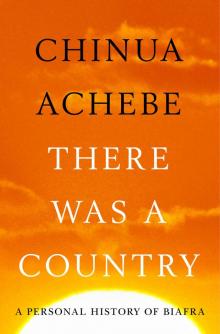 There Was a Country: A Memoir
There Was a Country: A Memoir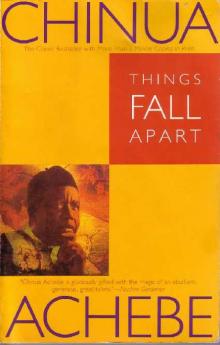 Things Fall Apart
Things Fall Apart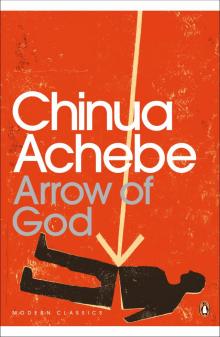 Arrow of God
Arrow of God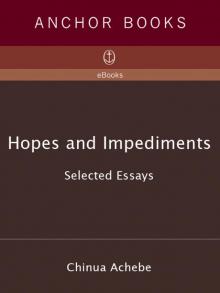 Hopes and Impediments: Selected Essays 1965-87
Hopes and Impediments: Selected Essays 1965-87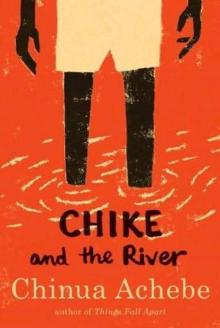 Chike and the River
Chike and the River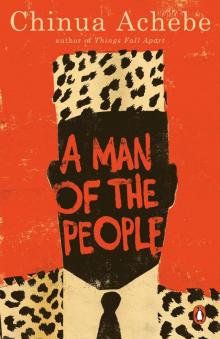 A Man of the People
A Man of the People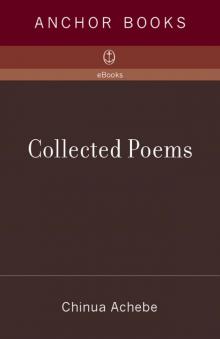 Chinua Achebe: Collected Poems
Chinua Achebe: Collected Poems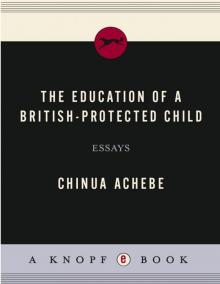 The Education of a British-Protected Child: Essays
The Education of a British-Protected Child: Essays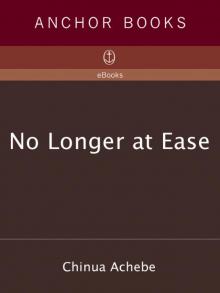 No Longer at Ease
No Longer at Ease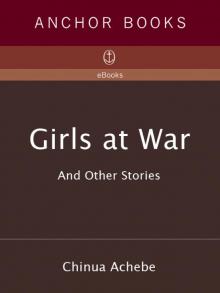 Girls at War
Girls at War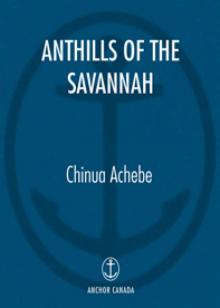 Anthills of the Savannah
Anthills of the Savannah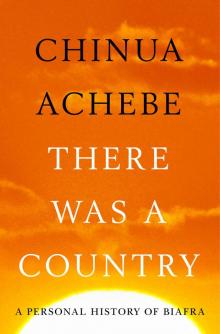 There Was a Country: A Personal History of Biafra
There Was a Country: A Personal History of Biafra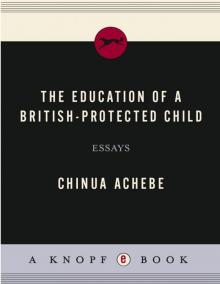 The Education of a British-Protected Child
The Education of a British-Protected Child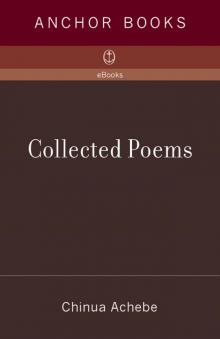 Collected Poems
Collected Poems